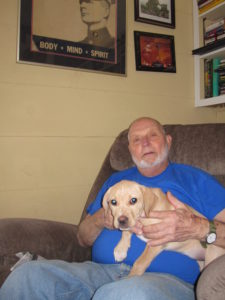
Phil Ernst relaxes with his puppy Bailey.
By Ashley Horst
Marketing & Fundraising Coordinator
Phil Ernst, who served in the Marines for 4 years and owned Woodbrier Nursery in the late 1970s, liked having a purpose and had always done his best at whatever he chose to do. For him, having bladder cancer wasn’t a reason to give up. He just needed to refocus his goals on what he could still accomplish like putting his affairs in order so that it would help his family and enjoying a canine companion.
For people with serious, chronic illnesses, it can be difficult to find purpose in life and to fulfill the desire to be needed. These diseases can be isolating as it becomes more challenging to leave home or even walk short distances to go outside or from one room to another.
The answer for Hospice of the Panhandle patient Ernst, at the suggestion of his doctor at the Martinsburg VA Medical Center, was to get a dog. Ernst needed—in his words—a wedge to get him out of his recliner and to feel useful.
When he first considered getting a dog, Ernst was concerned about what would happen to it when he was no longer able to care for it. With the help of his family and VA doctor, Ernst developed a plan for the dog’s future care. Then the search began.
Ernst regularly checked to see what dogs were available from the Berkeley County Humane Society. At the end of February, he decided to stop by on his way home from an appointment at the VA Medical Center. He walked down the row of dogs and in the very last kennel was an 11-week-old, Labrador-mix puppy.
“I’m going to find out about you, young lady,” he told her.
She had only been at the shelter for 45 minutes. Ernst felt that she was meant to be his since he’d been specifically looking for a female, yellow Labrador, and he soon left with his new pal Bailey.
Bailey encouraged Ernst to move around more as the energetic puppy loved to play and frequently needed to go outside for bathroom breaks. She also distracted him from his problems, especially on days when he wasn’t feeling the best.
Though at first she was apprehensive about her father getting a dog, Ernst’s daughter Mindy Hull said she soon realized that it was just what he needed. One day when her father wasn’t feeling well, she watched Bailey jump up in his recliner with him. Bailey circled a few times before settling down beside him, offering him comfort and companionship.
“She knew that’s where she needed to be,” said Mindy. “It was a good thing—good for both of them.”
Another distraction that Ernst enjoyed was volunteering for Meals on Wheels. He said that it gave him a reality check as his problems were small compared to many of the people to whom he delivered meals. Despite being a hospice patient beginning in December, 2018, he continued his own delivery route as long as he could. When he no longer was sure how he’d feel from day to day, he began riding with another volunteer when he felt up to it.
Ernst was surprised when his doctor recommended hospice care to him. He had been diagnosed with bladder cancer but at the time said that he didn’t feel that bad. He had one chemotherapy treatment and decided that the side effects weren’t worth the extra 3 months that the treatment might give him.
“I’m not going through that hell for a couple of months for more life like that,” he said.
When he made the decision to focus on maintaining the quality and comfort of his life, his doctor recommended hospice care because it could help him manage the pain and other symptoms that would come as the cancer worsened.
Once his doctor explained how hospice could help him, Ernst said that it was a “no brainer.”
Ernst, who lived independently until a week before he passed, said that he liked seeing more people during the week since the hospice team would come to his home. He also benefited by getting relief from pain and having help getting his medications refilled quickly when needed. Plus he could leave hospice care at any time if he chose.
When the time came that Ernst could no longer care for Bailey, the family put the plan they had developed in place. Bailey now lives on his son’s farm in Greenville.
While the Ernst and Bailey were only together a short time, they each filled a need for the other and showed how important it is to have a purpose no matter where you are in your life’s journey.
Ashley Horst has been in marketing and fundraising at Hospice of the Panhandle for 11 years. Hospice of the Panhandle is a not-for-profit agency that has cared for patients and families with life-limiting illnesses in Berkeley, Morgan, Hampshire and Jefferson counties since 1980. For more information on how hospice helps residents of the four-county area live more fully, call 304-264-0406, or visit on-line at www.hospiceotp.org
